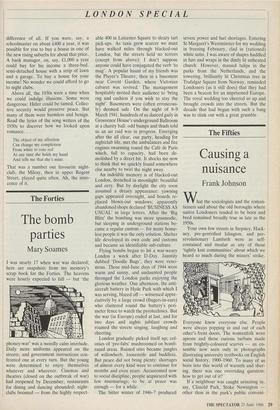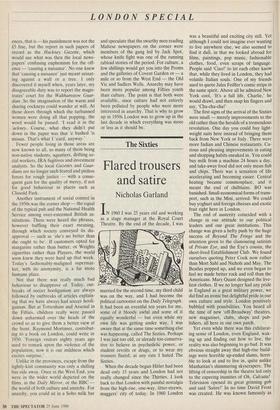The Fifties
Causing a nuisance
Frank Johnson
What the sociologists and the roman- ticisers said about the old boroughs where native Londoners tended to be born and bred remained broadly true as late as the 1950s.
Your own few streets in Stepney, Hack- ney, pre-gentrified Islington, and pre- revolutionary Lambeth were as self- contained and insular as any of those `tightly knit communities' about which we heard so much during the miners' strike.
Everyone knew everyone else. People were always popping in and out of each other's front doors. The womenfolk wore aprons and those curious turbans made from brightly-coloured scarves — an en- semble now seen only in photographs illustrating university textbooks on English social history, 1900-1960. To many of us born into this world of warmth and shar- ing, there was one overriding question: how to get out of it?
If a neighbour was caught urinating in, say, Clissold Park, Stoke Newington other than in the park's public conveni-
LONDON SPECIAL
ences, that is — his punishment was not the f5 fine, but the report in such papers of record as the Hackney Gazette, which would use what was then the local news- papers' confusing euphemism for the off- ence — 'causing a nuisance'. No one knew that 'causing a nuisance' just meant urinat- ing against a wall or a tree. I only discovered it myself when, years later, my disagreeable duty was to report the magis- trates' court for the Walthamstow Guar- dian. So the imagination of the warm and sharing cockneys could wander at will. At those doors through which the turbanned women were doing all that popping, the word would be passed: 'I read it in the 'ackney. Course, what they didn't put down in the paper was that 'e bashed 'is missus. That's what I 'eard, anyway.'
Fewer people living in those areas are now known to all, so many of them being non-native students, squatters, drifting so- cial workers, IRA fugitives and investment analysts. So the local Gazettes and Guar- dians are no longer such feared and pitiless forces for rough justice — with a conse- quent gain for the quality of mercy, if not for good behaviour in places such as Clissold Park.
Another instrument of social control in the 1950s was the corner shop — the equal of the typical pub and the National Health Service among over-esteemed British in- stitutions. There were heard the phrases, however baffling their exact meaning, through which society conveyed its dis- approval — such as 'she's no better than she ought to be'. If customers opted for margarine rather than butter, or Weights cigarettes rather than Players, the world soon knew they were hard up that week. Today's fashionably-maligned supermar- ket, with its anonymity, is a far more humane place.
Not that there was really much bad behaviour to disapprove of. Today, out- breaks of soccer hooliganism are always followed by outbreaks of articles explain- ing that we have always had soccer hooli- ganism. But at Tottenham and Arsenal in the Fifties, children really were passed down unharmed over the heads of the crowd so as to give them a better view at the front. Raymond Mortimer, contribut- ing to a book on London, could write in 1950: 'Foreign visitors eighty years ago used to remark upon the violence of the population; now it is our mildness which excites surprise.'
Unlike in the provinces, escape from the tightly-knit community was only a shilling bus ride away. Once in the West End, you were in the wider world depicted on the films, in the Daily Mirror, or the BBC the world of both culture and anarchy. For anarchy, you could sit in a Soho milk bar
and speculate that the swarthy men reading Maltese newspapers on the corner were members of the gang led by Jack Spot, whose knife fight was one of the running tabloid stories of the period. For culture, a few shillings would get you into the Proms and the galleries of Covent Garden or — a mile or so from the West End — the Old Vic and Sadlers Wells. Anarchy may have been more popular among Fifties youth than culture. The point is that both were available, since culture had not entirely been polluted by people who were more interested in anarchy. That is why to grow up in 1950s London was to grow up in the last decade in which everything was more or less as it should be.











































































 Previous page
Previous page